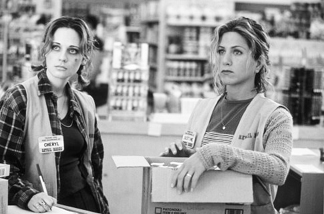The Good Girl
Aniston's World of Angst In the Heartland
By Patrick Reed

“I’m walking away from $1M per episode to do movies with ‘integrity’.”
No matter how many times we've seen it, filmmakers from Hollywood and the indie world alike just can't resist plumbing the vast expanse of the U.S. of A. for some wryly cynical story about the human condition. With few exceptions, the plots of these movies are set somewhere between the coasts-i.e., the landlocked "red" states, the ones that voted for that glad-handing cipher G.W. Bush-and they usually involve some sort of distressing event being shaped and formed by the joyless existence of middle-America. If, by chance, the setting isn't somewhere in the sticks, then it's in the suburbs of a major city, where things appear comfortable and bland on the surface, but are in the throes of febrile chaos down beneath. Taking these postulates as gospel-that most of the nation is a soul-sapping wasteland, and that America's suburban sameness and the "idiocy of rural life" (quoth K. Marx) have become one and the same at the turn of the century-we can begin to cinematically assemble a hipster's tip sheet of sorts, where the artistic folks in our nation's entertainment centers (many of them expatriates from the hinterlands, of course) set their sardonic, critical scalpels on, in effect, their own audiences and their supposed collective lifestyle.
From Robert Altman's Nashville to David Lynch's Blue Velvet and Oliver Stone's Natural Born Killers, some of the most enduring films over the past 30 years have tapped this theme of mid-American angst. More recently, avenging-dork directors Todd Solondz (Happiness) and Neil LaBute (Nurse Betty) staked their (early) careers on savaging social conventions, and recent straight-up dramas as Boys Don't Cry and Monster's Ball earned acclaim by portraying the heartland as an incubator of sexual and racist oppression. Perhaps most frustrating of all in its smug assumption-making is American Beauty, the well-crafted Oscar-winner that re-hashed the suburban alienation formula with some new-agey, floating plastic-bag life lessons to top it all off.
So where does The Good Girl fit in, measured against its thematic predecessors? Is it a breakthrough portrait of working-class struggle and the yearning to break free, or just another put-down? Is there any sustained empathy for the characters to be found, or are the snickering observations too much to overcome? Let's just say that the assembly line of misanthropic films about "normal" America has just churned out its latest repetitive product.
Jennifer Aniston plays Justine, a 30-year-old, second-tier makeover clerk at the Retail Rodeo, a Sav-A-Lot replica somewhere in the dead zone of Texas. She's in an empty marriage to Phil (John C. Reilly), an impotent pot-smoking painter that who spends his days lounging in front of the television with his creepy friend Bubba (Tim Blake Nelson). Justine's job is even more painful to endure, consisting of Tammy Faye Bakker-esque customers and zombie-eyed fellow employeesuntil a new, somewhat mysterious cashier named Holden (after Salinger's enduring protagonist) is hired. Played by Jake Gyllenhaal (the recent Lovely and Amazing, the upcoming Moonlight Mile), Holden is a college drop-out and budding Great American Writer who seems to have a spark of wild passion in his puppy-dog eyes, even if his real name is Tom and he still lives with his parents. Desperate for a way out, Justine clumsily seduces the young rebel without a clue, which sets up a series of comic-tragic events that force her to make a final decision on her life's fate: stay in the same domestic rut until the bitter end, or start a new journey with Holden, leading straight out into the unknown.
The Good Girl marks the second collaboration between director Miguel Arteta and writer Mike White, following 2000's childhood friendship-turned-adult harassment parable, Chuck and Buck. White's screenplay for Chuck and Buck drew most of the attention as the independent film became an art-house success, and the same will probably prove true for The Good Girl, as the plot of this movie seems to serve primarily as a springboard for in-jokes about the banality of day-to-day life-always a good draw for the disaffected. (White also plays the security guard at Retail Rodeo, a peppy fundamentalist Christian, which means of course that plenty of Ned Flanders-knock-off humor is in the offing) Redeeming qualities are scarce, but they do exist; several of the performances-Aniston's and Reilly's in particular-occasionally give emotional shading to characters that the screenplay fails to provide. Overall, though, The Good Girl's satire is mostly stale, its supercilious message thoroughly predictable: it's funny how life in America is so depressing, so boringisn't it? Well(yawn)if you say so.
HOME | THIS ISSUE | ACE ARCHIVES